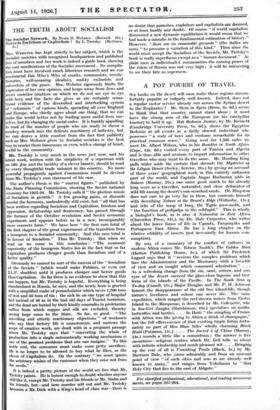A POT POURRI OF' TRAVEL
Six books on the desert will soon make those regions uncom- fortably popular or vulgarly well known. Indeed, does not a regular motor service already run across the Syrian desert to the Euphrates ? Mr. Stein in Syria (Bonn, 8s. 6a.) seems to think that that country cannot stand alone ; it must have the strong arm of the European (or his caterpillar tractor) to hold it up. But Bedouin Justice, by Mr. Kennett (Cambridge University Press, 7s. 6d.), shows the Egyptian Bedouin at all events as a fairly shrewd individual whc possesses " a code of laws and customs remarkable for its practical common sense." Going west for 1,500 miles we meet Dr. Albert Wilson, who in his Rambles in North Africa (Cape, 12s. 6d.) visited every part of Tunisia and Algeria and is thus able and anxious to impart information to other travellers who may want to do the same. Mr. Harding King pulls wider aside the curtain that shrouds the Mysteries of the Libyan Desert' (Seeley, Service, 21s.) by giving an account of three years' geographical work in this entirely unknown part of the world, and Captain Angus Buchanan adds in Sahara (Murray, 21s.) one more good notch to his already long score as a traveller, naturalist, and close delineator of wild life among the desert's sun-scorched sands. Dr. Hingston does not care to go very far in there, but contents himself with describing Nature at the Desert's Edge (Witherby, I5s.), and tells of the wasp of Iraq,. the Tigris puss-moth, and " the function of pedipalps in the solifugid." This is wholly a biologist's book, as is also A- Naturalist in East Africa (Clarendon Press, 15s.), by Dr. Hale Carpenter, who writes about the lower fornis of life in Uganda, Tanganyika and Portuguese East Africa. He has a long chapter on the relative edibility of insects (not necessarily for human con: sumption).
By way of a summary of the conflict of cultures in Modern Africa comes Mr. Edwin Smith's The Golden Stoat (Hatton Publishing House, 5s.), of which Sir 'Frederick Lugard says that 'it ".reviews the complex problems which face the Administrator and the Missionary With a breadth of view and an insight which command admiration." . . . As a refreshing change from the sin, sand, sorrow, and sore eyes of the desert succeed the glass-clear lagoons and tre• ferns of the islands of the. Pacific. In The South Seas of To-day (Cassell, 21s.) Major Douglas and Mr. P. H. Johnson lament the disappearance of the old free island-life, though nature's loveliness and colour can never die. The same expedition, which ranged the reef-strewn waters from Easter Island to the. Marquesas, is described by Mr. Collenette, whc in Sea-Girt Jungles (Hutchinson, 18s.) specializes on moths, butterflies and beetles. . . . In Haiti " the mingling Franee with Africa was like giving to Africa a drink of champagne," but the full effervescence of that exciting tipple forms fortu- nately no part of Miss Blair Niles' wholly, charming glack Haiti (Putnam, , . . The Sacred 5 of China (!Hurray, 24s.), sounds, a little like a conundrum ; the answer is fide mountains=religious centres which Dr. Geil tells us about with infinite scholarship and much pleasant wit.. . . Bringing up the rear ,of all is Vanishing Trails (Black, 5s.) by Harrison Dale, who yarns admirably and from an . unusual point of view " of such cities and seas as are already well known to many," and ranges from Yokohama., to " that Holy City that- lies to the east of 'litigate."


































 Previous page
Previous page